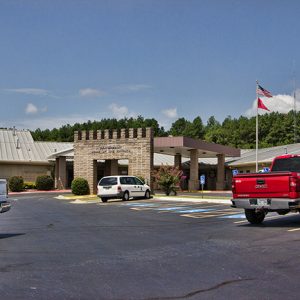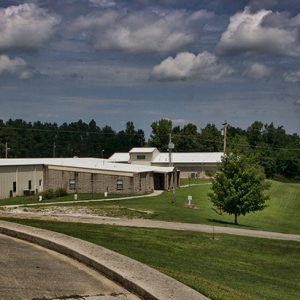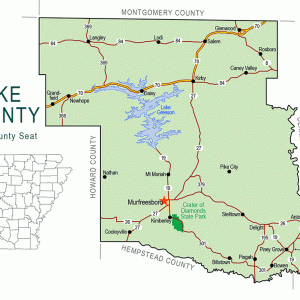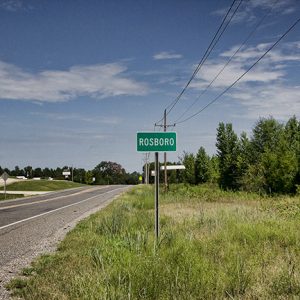calsfoundation@cals.org
Rosboro (Pike County)
Rosboro is an unincorporated community located in the northeastern corner of Pike County. It is five miles west of Amity (Clark County) and six miles east of Glenwood (Pike County). During its heyday, the company town of Rosboro was a major operational center for the Caddo River Lumber Company in the Ouachita Mountains, placed in an area that was a vast virgin forest of short-leaf pine trees.
Thomas Whitaker “Whit” Rosborough, a sawmill owner who lived near Kansas City, Missouri, became interested in this Arkansas forest and decided to move there, bringing some of his employees with him. After arriving and investigating the area, he decided that an area near Amity would be an ideal place to build his sawmill. However, the local citizens did not approve of the venture because Rosborough had African-American employees, so he found another place just five miles west of Amity. He named the new town Rosboro, a shortened version of his surname. The Caddo River Lumber Company’s mill was built around 1907. People began moving in, and soon the population was between 400 and 500. Rosboro became a thriving, well-populated sawmill town with several stores, more than 100 “shotgun” houses for families, a hotel for single employees, a kiln, a commissary, and a company–owned meat market. Everyone had electricity generated by a turbine, plus running water from a water tower.
The town was segregated, having separate living areas for the Black and white residents. Both groups had their own churches and schools. In the white people’s area was a theater, while the Black neighborhood had an entertainment venue called the “Barrell House.”
The Missouri Pacific Railroad had one passenger train that ran daily, plus a freight train. A depot was built across the street from the company office. A train carried logs thirty or forty miles away, and there were camps along the way for the employees. This log train ran through Self Creek settlement near Daisy (Pike County).
In 1915, one of the sawmills burned. Three years later, the company established another town, Mauldin (Montgomery County). Heavy timber production began there in 1922. Logs were shipped via railroad to Rosboro for processing. Since Rosboro was the main operation, it outlasted Mauldin and another mill at Graysonia (Clark County) by almost a decade. In 1939, the company closed another Rosboro mill, and Rosborough made plans to move his operations to Springfield, Oregon. Nearly all of his employees, both Black and white, decided to move with him. Other employees moved out of Rosboro to find other jobs, which effectively ended the town. The Ozan Lumber Mill, smaller than Rosborough’s, shut down in 1956. The population of the area declined, and the school consolidated with Glenwood in 1956.
Amity and Glenwood schools consolidated in 1995. The new high school was built at Rosboro, which is between the two towns, just east of the old town of Rosboro. The school is called Centerpoint High School.
There is little left of Rosboro in the twenty-first century. The stores are all gone, save for an empty store across the highway from the high school. Part of an old store stands just west of the high school, along with the old water tower. Local residents not employed by the school commute to other nearby communities such as Amity, Glenwood, Hot Springs (Garland County), and Arkadelphia (Clark County).
For additional information:
Early History of Pike County, Arkansas: The First Hundred Years. Murfreesboro, AR: Pike County Archives and History Society, 1989.
Smith, Kenneth L. Sawmill: The Story of Cutting the Last Great Virgin Forest East of the Rockies. Fayetteville: University of Arkansas Press, 1986.
Doris Russell Foshee
Murfreesboro, Arkansas
 Ozan Lumber Company
Ozan Lumber Company Centerpoint High School
Centerpoint High School  Centerpoint High School FFA
Centerpoint High School FFA  Pike County Map
Pike County Map  Rosboro
Rosboro 



My dad worked for Rosobo lumber in Arkansas and moved with the company to Springfield, Oregon.
I was named after Thomas Whitaker “Whit” Rosborough. My name is Tommy Whit.
The name is unique. My daddy was named for this town because his uncle, Crawford Hendrix, was working at the mill in 1920 when Daddy was born. My great-uncle told me stories about the community.